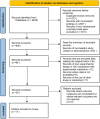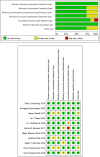Efficacy of vitamin D supplementation on depressive symptoms in older patients: a meta-analysis of randomized controlled trials
- PMID: 39450108
- PMCID: PMC11500197
- DOI: 10.3389/fmed.2024.1467234
Efficacy of vitamin D supplementation on depressive symptoms in older patients: a meta-analysis of randomized controlled trials
Abstract
Background: The relationship between vitamin D and depression has garnered significant attention in recent years. However, the efficacy of vitamin D in ameliorating depression among specific subgroups of older patients remains controversial. This study aimed to assess the impact of vitamin D supplementation on depressive symptoms and the prevalence of depression in older adults. Additionally, the study sought to examine potential moderating factors, including differences among population subgroups and various supplementation strategies.
Methods: A systematic literature search was conducted in the databases PubMed, EMBASE, Web of Science, and the Cochrane Library up to March 2024. The RevMan 5.3 software was utilized to calculate the standardized mean difference (SMD) and to evaluate the quality of evidence using the Grading of Recommendations Assessment, Development and Evaluation (GRADE) approach. The objective was to determine the efficacy of vitamin D supplementation in alleviating depressive symptoms or treating depression in older adults.
Results: This meta-analysis encompassed eleven studies, comprising a total of 21,561 participants. The findings did not indicate a statistically significant therapeutic benefit of vitamin D supplementation for depression in older patients [SMD: -0.10; 95% CI: (-1.19, 0.00); p = 0.05]. Subgroup analyses revealed that the efficacy of vitamin D intervention in geriatric depression correlated with several factors, including baseline serum 25(OH)D levels, the dosage of the intervention, gender, and the initial presence of depressive symptoms or a diagnosis of depression.
Conclusion: The current evidence is insufficient to conclusively establish the significant efficacy of vitamin D supplementation in alleviating depressive symptoms among older patients. Consequently, additional randomized controlled trials are warranted to further validate the relationship between vitamin D supplementation and depression in the older adults.
Keywords: depression; depressive symptoms; geriatrics; meta-analysis; therapeutic evaluation; vitamin D.
Copyright © 2024 Fu, Zhang, Chen, Yu, Yan, Jing, Yu, Li and Guo.
Conflict of interest statement
The authors declare that the research was conducted in the absence of any commercial or financial relationships that could be construed as a potential conflict of interest.
Figures






Similar articles
-
Vitamin D supplementation for depression in older adults: a meta-analysis of randomized controlled trials.Front Nutr. 2023 Jun 21;10:1169436. doi: 10.3389/fnut.2023.1169436. eCollection 2023. Front Nutr. 2023. PMID: 37415914 Free PMC article.
-
The effect of vitamin D supplementation on depression: a systematic review and dose-response meta-analysis of randomized controlled trials.Psychol Med. 2024 Nov 18;54(15):1-10. doi: 10.1017/S0033291724001697. Online ahead of print. Psychol Med. 2024. PMID: 39552387 Free PMC article. Review.
-
The effect of vitamin D supplementation on primary depression: A meta-analysis.J Affect Disord. 2024 Jan 1;344:653-661. doi: 10.1016/j.jad.2023.10.021. Epub 2023 Oct 16. J Affect Disord. 2024. PMID: 37852593
-
The Effect of Vitamin D Supplementation on Symptoms of Depression in Patients with Type 2 Diabetes Mellitus: A Systematic Review and Meta-Analysis of Randomized Controlled Trials.Acta Med Indones. 2022 Oct;54(4):574-584. Acta Med Indones. 2022. PMID: 36624711
-
Association of vitamin D in individuals with periodontitis: an updated systematic review and meta-analysis.BMC Oral Health. 2023 Jun 13;23(1):387. doi: 10.1186/s12903-023-03120-w. BMC Oral Health. 2023. PMID: 37312090 Free PMC article.
Cited by
-
The role of vitamin D in sleep regulation: mechanisms, clinical advances, and future directions.Front Nutr. 2025 Jun 2;12:1595813. doi: 10.3389/fnut.2025.1595813. eCollection 2025. Front Nutr. 2025. PMID: 40529426 Free PMC article. Review.
-
The Role of Vitamin D in the Management of Major Depressive Disorder: A Systematic Review.Pharmaceuticals (Basel). 2025 May 25;18(6):792. doi: 10.3390/ph18060792. Pharmaceuticals (Basel). 2025. PMID: 40573189 Free PMC article. Review.
References
Publication types
LinkOut - more resources
Full Text Sources

